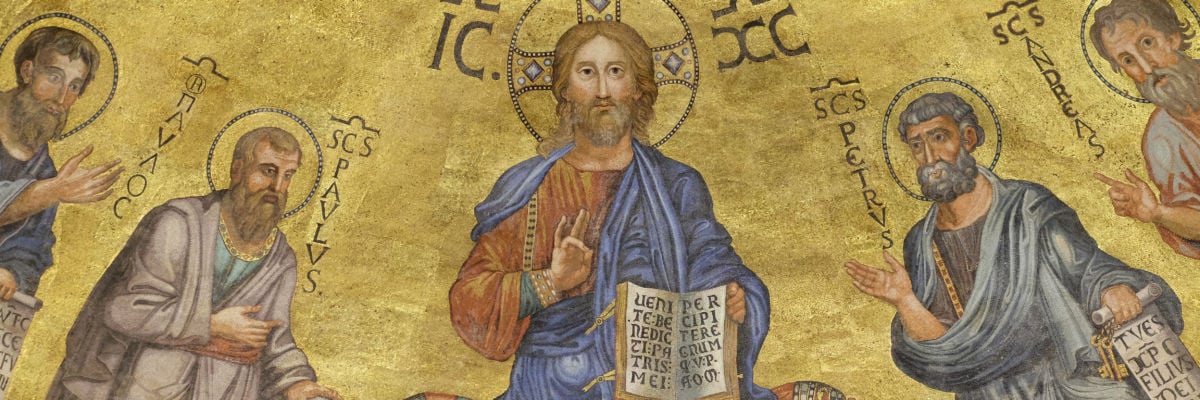
“You hypocrites!” declared Jesus to the scribes and Pharisees. “Well did Isaiah prophesy of you, when he said, ‘This people honors me with their lips, but their hearts are far from me; in vain do they worship me, teaching as doctrines the precepts of men’” (Matt. 15:6-9).
What inspired this harsh rebuke was the scribes and Pharisees’ attack on Jesus’ disciples for their failure to observe the religious custom of washing their hands before eating. Jesus’ antagonists made much of their attention to detail in observing certain religious customs, but often at the expense of the divine Law—in this case, one of the Ten Commandments.
The object of Jesus’ criticism was the Korban—the custom of dedicating one’s belongings to the Temple, but retaining their use. This practice allowed one to forego familial obligations to support one’s elderly parents by claiming one’s property was dedicated to the Temple and therefore inviolable. Jesus declared this contrary to the commandment to honor father and mother (Ex. 20:12).
Christ’s attack on the Korban is important today because non-Catholics, especially Fundamentalists, point to this episode when they argue against tradition (customs) in general and Sacred Tradition in particular. They regard Jesus’ rejection of a particular religious custom and his use of Scripture to overrule it (Matt. 15:3) as the basis for rejecting Sacred Tradition.
Most Catholics reply by showing that his criticism of the Korban didn’t mean Jesus rejected all religious tradition. Biblical texts are cited to prove the apostolic Church accepted Tradition as a norm for faith and practice (2 Thessalonians 2:15, 1 Cor. 11:2, 2 Tim. 1:13-14) and that the Bible explicitly says not everything Jesus did was written down (John 20:30; 21:35).
Catholics go on to show how it is only on the faulty assumption that all of divine revelation is explicitly inscripturated that one can say that the Tradition mentioned by Paul has been completely and formally retained in the Bible. This assumption begs the question and is unsupported by the Bible itself.
Furthermore, Catholics distinguish capital “T” Tradition, which comes from God, either through Christ or the apostles (Luke 10:16), from lowercase “t” human traditions or customs. While the latter may (although need not) contradict the Word of God, the former cannot, and it is capital “T” Tradition about which Catholicism is principally concerned.
What this typical Catholic rejoinder neglects is the fact that Jesus not only didn’t attack the Catholic view of Tradition, his words and actions actually supported a central element of it—the idea of Tradition as the authentic understanding and application of the biblical message.
Not only is there a difference between Tradition originating with God and traditions understood as human customs, there’s also a distinction between Tradition as divinely revealed truth not explicitly found in Scripture and, more broadly, Tradition as the whole apostolic faith as passed down from the apostles (2 Thess. 2:15).
Tradition in its broad sense provides normative understandings of biblical teaching. These normative understandings of Scripture are themselves Tradition in yet another sense of the word. (Catholic theologians have argued over the usefulness of a word with so many different meanings and senses to it.)
For example, the Arians of the fourth century and the Jehovah’s Witnesses of today interpret the New Testament as teaching that, as the pre-existent Word, Jesus is inferior to God the Father, not equal to him. This interpretation is incompatible with the Tradition of the Church in its broad sense, which affirms the equality of the Word and God the Father. Tradition in its broad sense, in turn, provides a normative sense of the biblical faith to properly interpret and apply the texts misused by the Arians and the Witnesses.
In other words, Tradition allows us to say that, whatever the Bible means when it talks about Jesus as the pre-existent Word, it doesn’t mean what the Arians taught and the Witnesses still teach. Authentic Tradition has ruled out this interpretation.
Similarly, when Jesus attacked the Pharisaic custom of the Korban as a violation of the commandment to honor father and mother, he replaced a wrong interpretation of Scripture which permitted the practice with a correct one which didn’t. Spurious, human tradition was supplanted by authentic, divine Tradition.
The apostles did the same thing when interpreting the Old Testament or explaining the teaching of Jesus. Apostolic teaching was the standard for the early Church. The interpretative and teaching function of the pope and the bishops (the magisterium), who share in the teaching ministry of Christ and the apostles, follows this pattern.
The Tradition of the Church, as expounded and defined by the magisterium, establishes normative interpretations of the biblical message over against inauthentic interpretations individuals or sects might adopt as “what the Bible really teaches.”
“But wait,” someone may object, “Jesus and the apostles were bearers of new revelation. The pope and the bishops aren’t. Even the Catholic Church concedes that public revelation ceased with the end of the apostolic age. How can you claim the magisterium carries on the same teaching ministry as the apostles?”
There’s something to this objection. Jesus and the apostles had two functions with respect to divine revelation. They bore new revelation from God, but also faithfully passed on and applied revelation, whether new or old. The pope and the bishops don’t transmit new revelation as Jesus and the apostles did, because public revelation was completed with the close of the apostolic age (Jude 3). The pope and the bishops are successors to the apostles, not apostles themselves.
Nevertheless, the apostolic task of authoritatively and definitively passing on and applying revelation already received is carried on by the pope and the bishops as successors to the apostles. Their ministry is apostolic in this sense. After all, if the apostolic teaching function was essential to the life of the Church in the apostolic age, how much more so must it be for the Church as that age recedes over the horizon of history?
Tradition understood in the sense of the normative, authentic, and definitive interpretation of biblical teaching (Tradition with a capital “T”)isn’t contradicted by Jesus’ repudiation of the Korban. By citing the commandment to honor father and mother, Christ not only subordinated a human tradition to the written Word of God (as Fundamentalists teach), but offered an infallible interpretation and application of a scriptural text, thus establishing the precedent for the apostles and their successors, the bishops, to follow.



